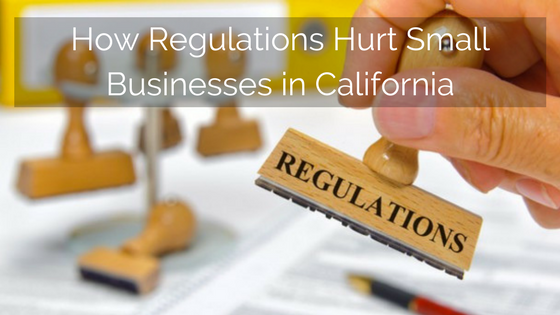
Regulations hurt small businesses in California. Minimum wage continues to grow, which simultaneously raise costs on businesses and harms many low-wage workers and consumers. California is also pursuing regulations that would reduce the viability of Uber and Lyft, the popular ride-for-hire services revolutionizing how people commute. These regulations are just two of California’s many regulatory orders that are burdening the state economy. Contrast this to states like Texas, North Dakota and Virginia, who impose regulations that aren’t overly burdensome and, therefore, encourage economic growth and development. California could learn a thing or two from this pro-growth states.
A study was done for Pacific Research Institute and the results exemplify how regulations hurt small businesses in California. The 50 State Small Business Regulation Index, compares all 50 states based on the impact from each one’s regulatory environment on small businesses. The Index creates a common platform, based on 14 regulatory components, to compare each state’s regulatory burdens on small businesses to highlight which regulatory environments are associated with slower small business growth, and which regulatory environments are associated with more robust small business activity.
A review of this index shows that California was the worst ranked state and it shows because California also experienced significantly slower small business growth because regulations hurt small businesses.
For instance, average annual small business payroll growth between 2002 and 2011 (the latest data available) in the states ranked in the top third was 3 percent—nearly double California’s average annual small business payroll growth of 1.6 percent. The same pattern held for average annual growth in employment—small business employment in the states in the top third grew 0.1 percent per year compared to a decline of 0.8 percent per year in California.
So what’s California doing wrong?
California is not a right-to-work state. Studies continually show that states with right-to-work laws experience faster growth than states without them. The top regulatory reform priority for California should be to pass right-to-work laws. These types of regulations hurt small businesses. California needs to reform its anti-growth regulations and ease the burden on small businesses. Reform will improve the incentives to start and run a small business in California and will reinvigorate the economy in the state.

